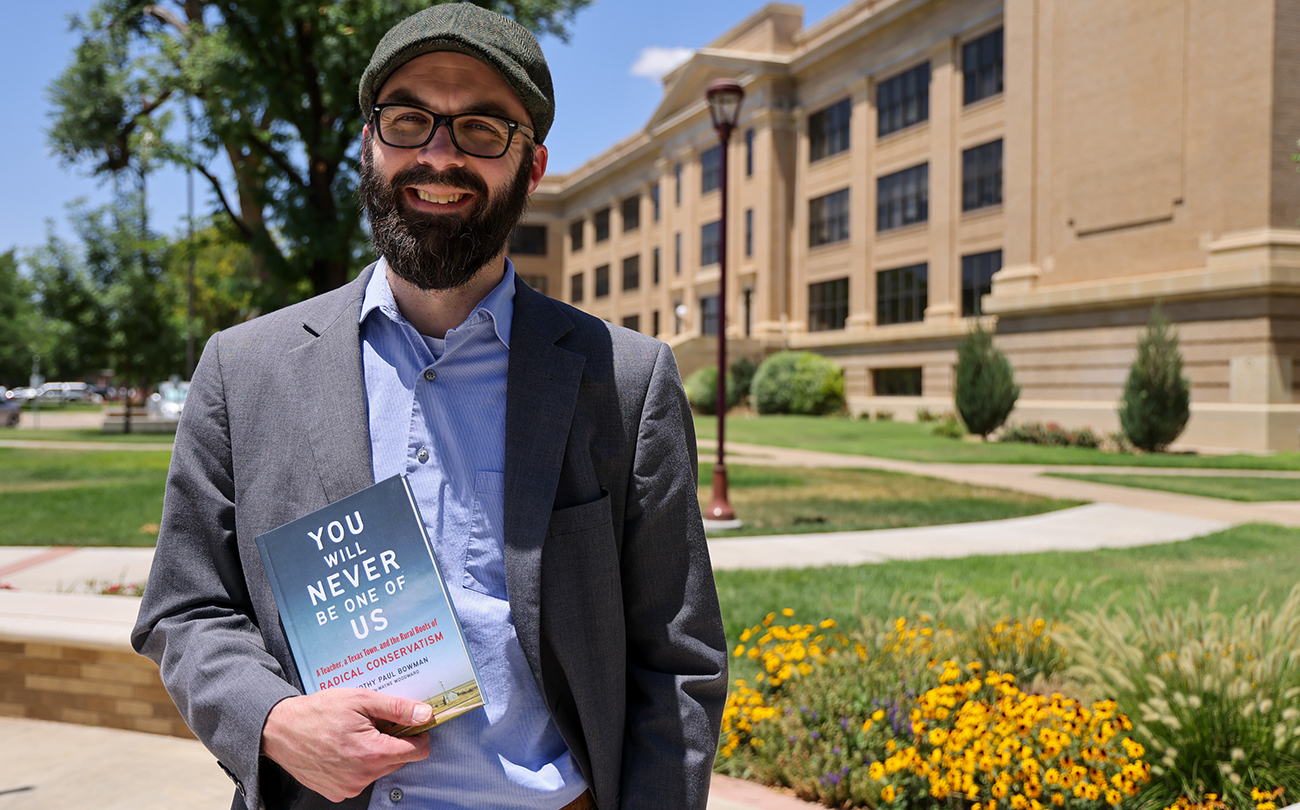- Arts
- History
- Featured
WT’s Bowman Explores Local Roots of National Political Battles in New Book
Copy by Chip Chandler, 806-651-2124, cchandler@wtamu.edu
CANYON, Texas — A new book by West Texas A&M University’s history department head will shed light on a 1970s political battle in the Texas Panhandle that presaged ongoing culture wars.
“You Will Never Be One of Us: A Teacher, a Texas Town and the Rural Roots of Radical Conservatism” by Dr. Timothy Bowman will be published July 28 by the University of Oklahoma Press.
In the book, Bowman profiles Wayne Woodward, a 1968 graduate of then-West Texas State University, who began teaching English at La Plata Junior High School in Hereford in 1969.
“Wayne was a product of the ’60s,” Bowman said. “He wasn’t super political, but he had an awakening in college. He taught in Death Valley, California, then came back to the Panhandle, and the school administration put up with his mostly harmless liberal activities for a time.”
But in 1975, Woodward tried to start a Hereford chapter of the American Civil Liberties Union, thinking it could help protect the rights of his students and their parents, mostly Mexican and Mexican American workers at the feedlots and other agricultural businesses around Hereford.
When school administrators caught wind of Woodward’s actions, he was abruptly fired.
“Wayne was naïve about conservatives’ hatred of the ACLU, especially in the context of political battles that took place in the 1960s and ’70s,” Bowman said. “They thought he was wanting to help unionize local ag workers.”
He filed suit against the school district, claiming it had violated his constitutional rights to free speech and due process, prevailing at the district court level. But after Hereford Independent School District appealed the verdict, Woodward decided to settle his lawsuit rather than continue with a protracted legal battle. Eventually, he became a nurse practitioner and now lives at Lake Tanglewood; he never taught again.
Bowman became acquainted with Woodward after publishing his first book, “Blood Oranges: Colonialism and Agriculture in the South Texas Borderlands” in 2016.
“What really drove my interest was trying to understand the people who did this to Wayne,” Bowman said. “These were generally good, upstanding people who believed they were taking the right course of action against someone who was a threat to their town. They deserve to be taken seriously and understood on their own terms.”
Bowman said his balanced examination of the conflagration is sympathetic to both sides, which he hopes will help provide context for continuing political wars around the country.
“It looks at conservatism in the Panhandle in the 1970s and why conservatives and liberals started speaking different languages and not getting along,” Bowman said. “Ultimately, it’s an attempt to understand the origins of our divisive political culture from a rural perspective.”
The book “expands and often upends existing histories by locating the early culture wars not in coastal campuses and think tanks but in Hereford,” said Jason Mellard, author of “Progressive Country: How the 1970s Transformed the Texan in Popular Culture.”
“The themes of controversy and speech, patriotism and protest, outrage and offense, that are the political oxygen of the early twenty-first century all appear here, near fully formed, in the High Plains of 1974,” Mellard said.
Bowman joined WT in fall 2012. He earned a bachelor’s degree from Texas Christian University in 2002, a master’s degree from the University of Texas–Arlington in 2005 and a Ph.D. from Southern Methodist University in 2011. In addition to serving as department head, Bowman teaches a variety of courses related to the North American Southwest and modern United States history.
Bowman’s book is reflective of WT’s status as a regional research university primarily focused on the people and places of the Texas Panhandle, the central mission of the University’s long-range plan, WT 125: From the Panhandle to the World.
That plan is fueled by the historic, $125 million One West comprehensive fundraising campaign. To date, the five-year campaign — which publicly launched Sept. 23 — has raised about $110 million.
About West Texas A&M University
WT is located in Canyon, Texas, on a 342-acre residential campus. Established in 1910, the University has been part of The Texas A&M University System since 1990. WT, a Hispanic Serving Institution since 2016, boasts an enrollment of about 10,000 and offers 59 undergraduate degree programs and more than 40 graduate degrees, including two doctoral degrees. The University is also home to the Panhandle-Plains Historical Museum, the largest history museum in the state and the home of one of the Southwest’s finest art collections. The Buffaloes are a member of the NCAA Division II Lone Star Conference and offers 14 men’s and women’s athletics programs.
—WT—

